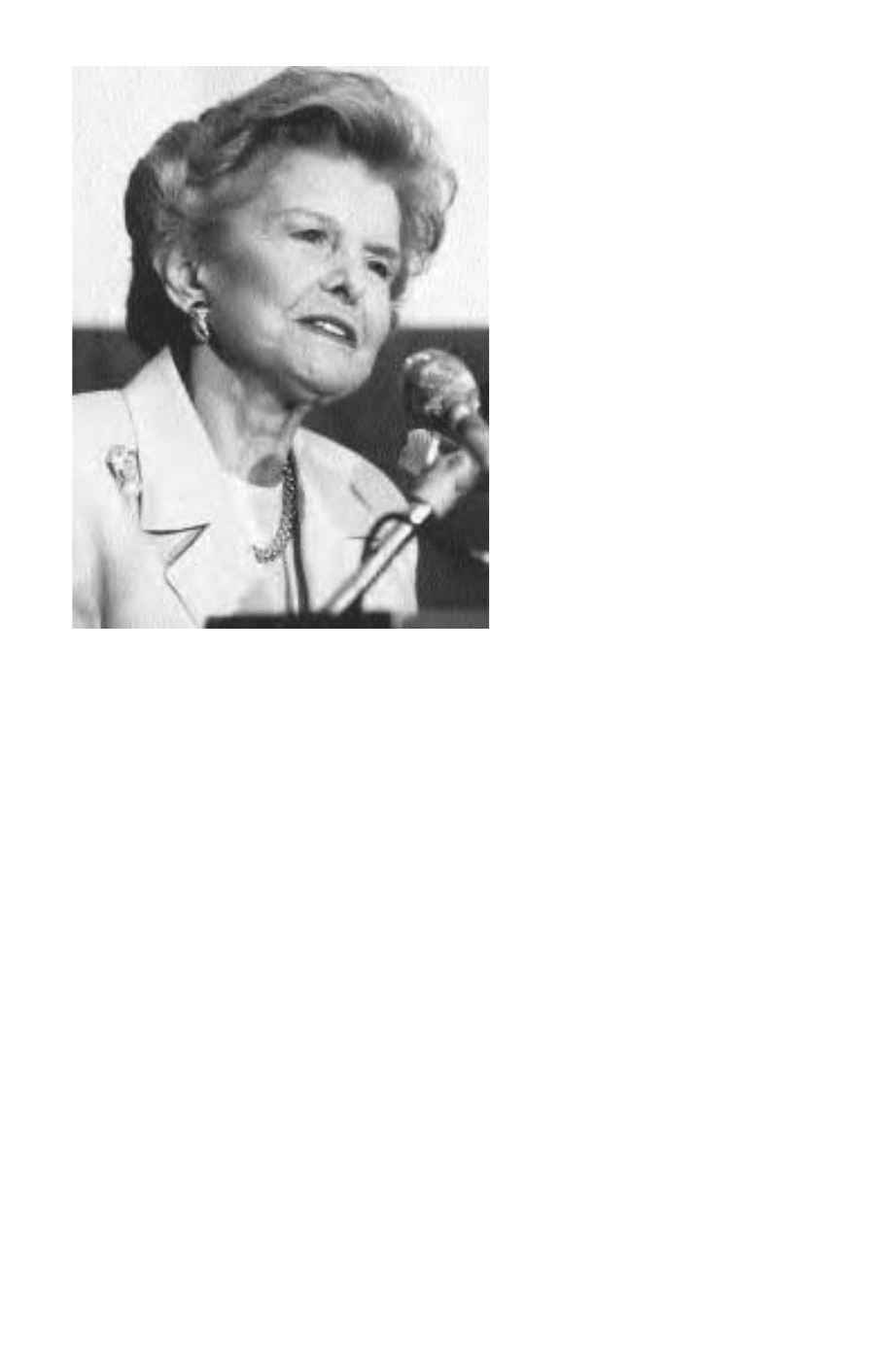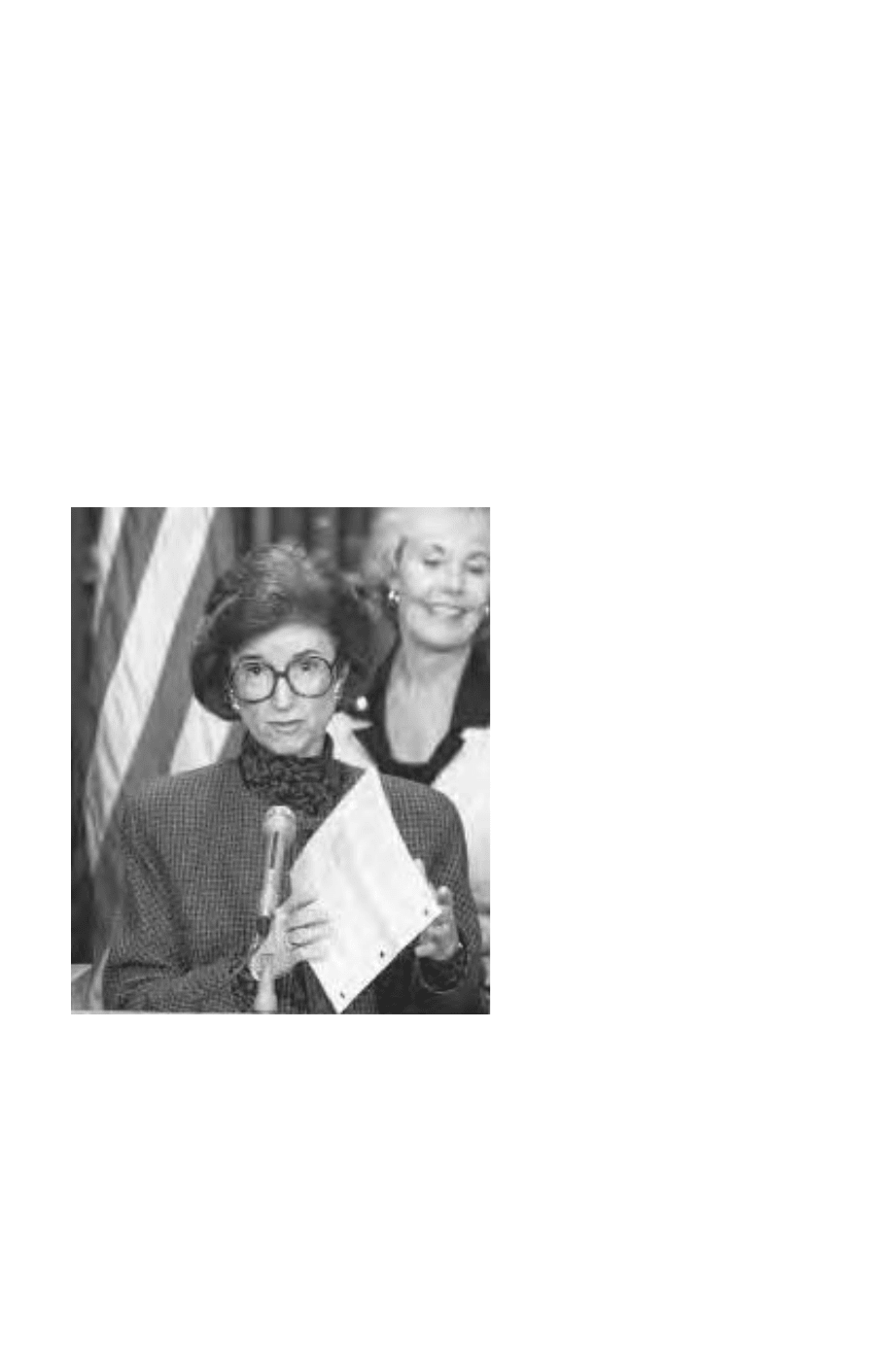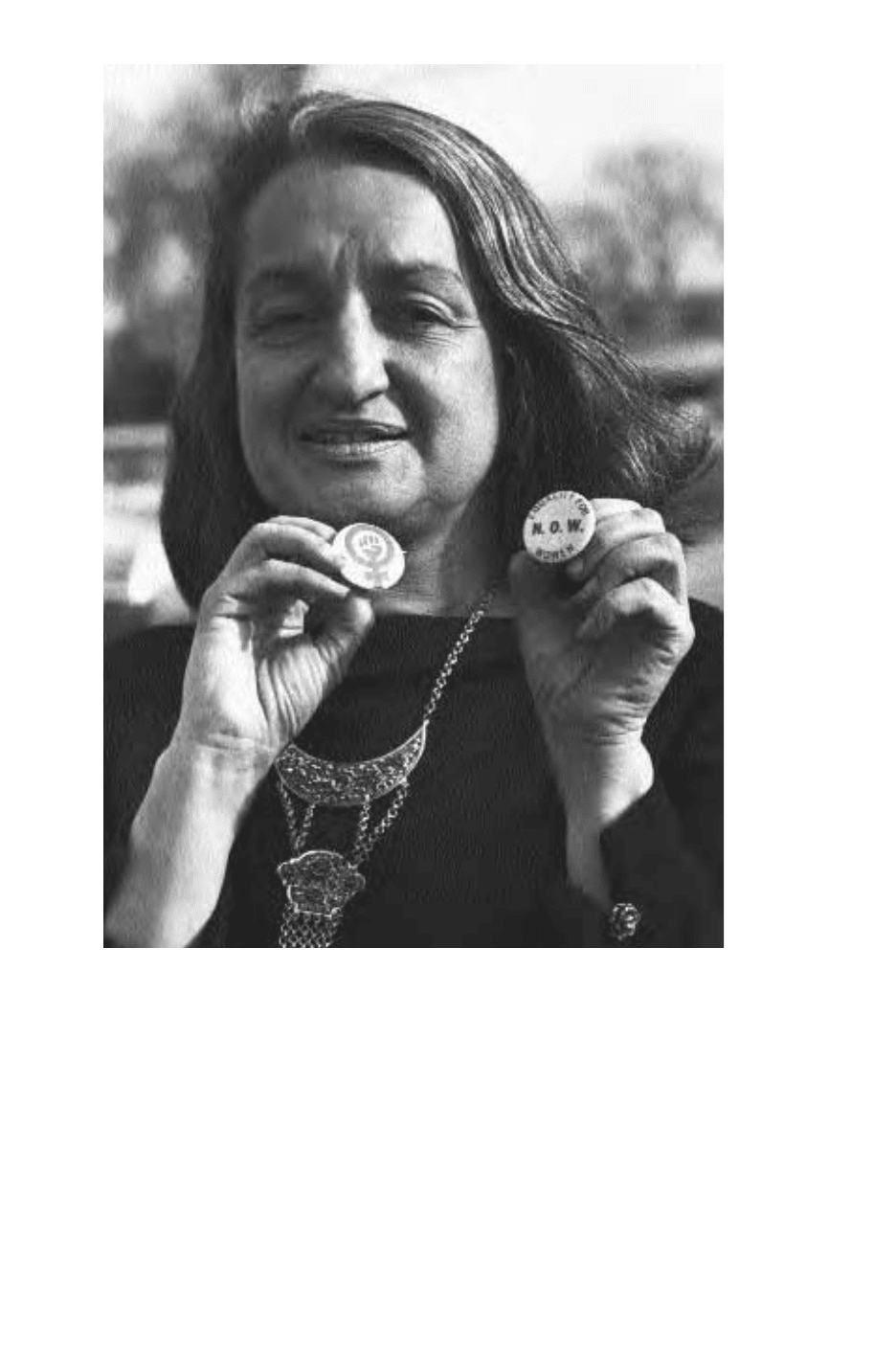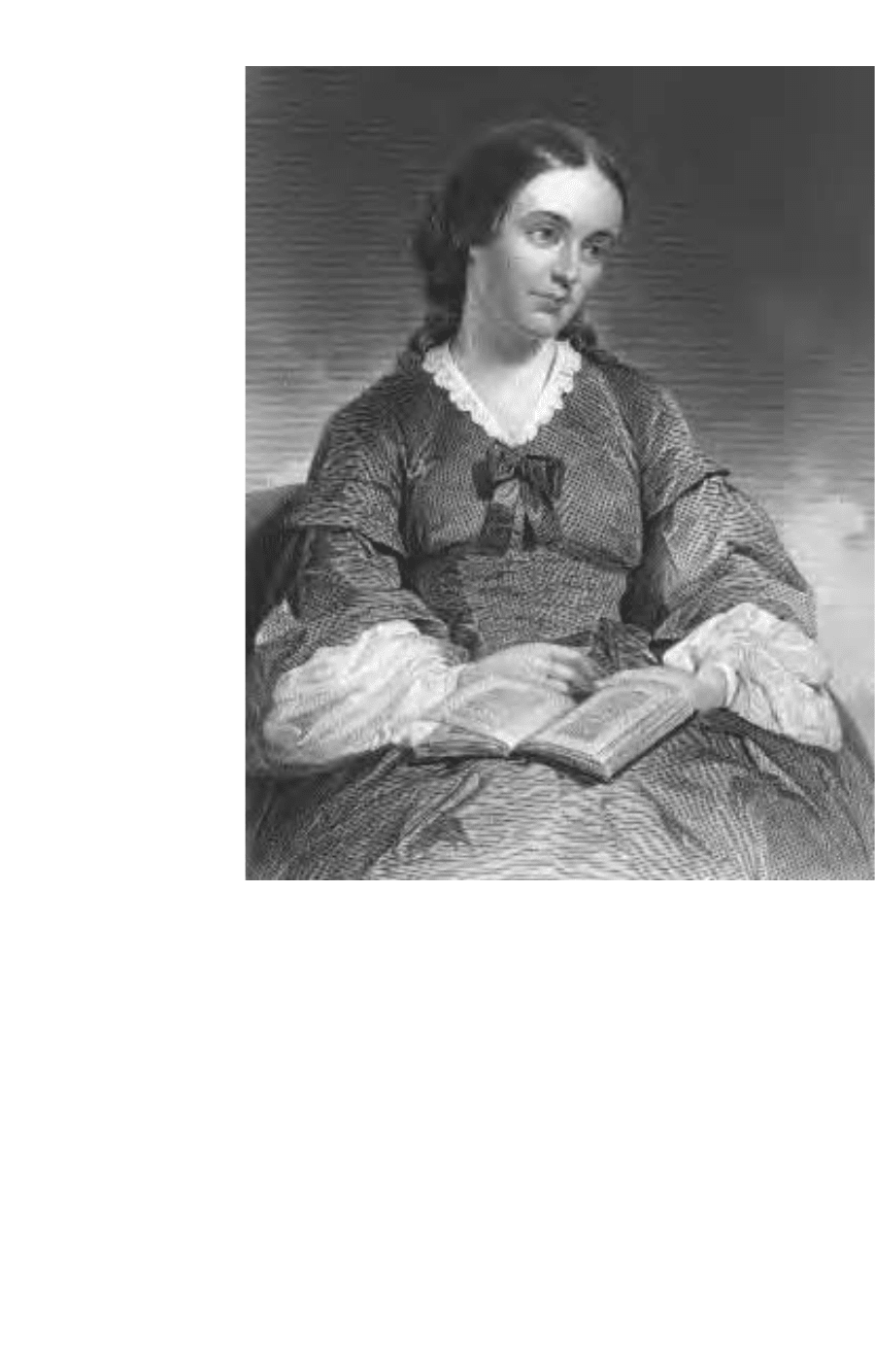Schenken Suzanne O’Dea. From Suffrage to the Senate: An Encyclopedia of American Women in Politics (2 Volumes)
Подождите немного. Документ загружается.


Fonda, Jane Seymour (b. 1937)
Actress Jane Fonda became a national political figure in the late 1960s and
early 1970s. Her vocal support for the Black Panthers and American In-
dian militants and her outspoken opposition to the war in Vietnam placed
her on the Nixon administration’s enemies list. Her 1972 trip to North
Vietnam and her broadcasts over Radio Hanoi urging U.S. pilots to stop
bombing the North earned her the appellation “Hanoi Jane”; some mem-
bers of Congress introduced measures that called for her to be tried for
treason. Describing herself as “a revolutionary woman,” Fonda encoun-
tered difficulty securing movie roles in the early 1970s. When her popu-
larity was restored, Fonda made several movies in which a woman’s con-
sciousness is raised through personal experience.
Born in New York City, Jane Fonda is the daughter of actor Henry
Fonda. She attended Vassar College in 1955 and 1956, studied art in Paris,
and studied acting under Lee Strasberg. She has worked on the Broadway
stage and has made several physical fitness videos.
References H. W. Wilson, Current Biography Yearbook, 1986 (1986).
Ford, Elizabeth Ann (Betty) Bloomer (b. 1918)
Wife of President Gerald R. Ford, Betty Ford was first lady from 1974 to
1977. The Fords entered the White House following Richard Nixon’s res-
ignation from the presidency for his role in the Watergate scandal. Betty
Ford’s candor in discussing personal and political topics worried her
husband’s political advisers, embarrassed her children, scandalized some
observers, and endeared her to many Americans. She continued her
Ford, Elizabeth Ann (Betty) Bloomer 275
Anti–Vietnam War
activist Jane Fonda
visited the Bach Mai
Hospital in Hanoi,
Vietnam, which was
bombed by U.S.
forces (undated,
MTI/Eastfoto)

characteristic forthrightness and leader-
ship after she and her husband returned to
private life.
Born in Chicago, Illinois, Betty Ford
attended the Bennington School of Dance
for two summers beginning in 1936 and
studied under Martha Graham in New
York City. In 1941, she returned to Grand
Rapids, Michigan, where she had spent her
youth and formed her own dance group.
There, she married Gerald R. Ford in
1948. Two weeks after their wedding, Ger-
ald Ford won election to Congress.
The Fords raised their family in
Alexandria, Virginia, where Betty Ford was
involved in family activities and Republi-
can women’s organizations. In 1973, upon
the resignation of Vice President Spiro Ag-
new, Nixon chose Gerald Ford for vice
president. When Nixon resigned in August
1974, Gerald Ford became president of the United States, and Betty Ford
became first lady.
Diagnosed with breast cancer in September 1974, Betty Ford told the
nation that she had the disease, a matter that she could have kept confi-
dential. Instead, she became an advocate for increased awareness of breast
cancer and other women’s health concerns and encouraged women to ex-
amine themselves for lumps and to regularly get mammograms in order
to detect breast cancer early.
Ford’s openness during a taped interview for the television news pro-
gram “60 Minutes” created a flurry of speculation that she had become a
political liability for her husband. She had commented that premarital sex
might lower the divorce rate, that she favored the U.S. Supreme Court’s
decision legalizing abortion, that she did not think her children used
drugs, and that if her daughter were having an affair, she would want to
know the man and to counsel her daughter. The strong initial reaction to
the interview concerned the president’s advisers until public opinion polls
placed her popularity at 75 percent.
During her years in the White House, Betty Ford became an active
advocate for feminist issues. A strong supporter of the Equal Rights
Amendment, she gave speeches and wrote to and called state legislators,
urging them to vote for its ratification. In addition, she encouraged her
husband to appoint women to high offices in the federal government and
276 Ford, Elizabeth Ann (Betty) Bloomer
First Lady Betty Ford
discussed a new
report on the impact
of substance abuse on
American women,
1996 (Archive
Photos)

convinced him to decline invitations to the annual Gridiron Club dinner
until the group elected a woman member.
In 1978, she entered treatment for dependence on alcohol and pre-
scription medications. Years of suffering from arthritis and a pinched
nerve had left her addicted to pain medication, which was complicated by
her use of alcohol. As with her experience with cancer, Betty Ford became
an advocate for improved awareness, education, and treatment of alcohol
and other drug dependencies. She cofounded the Betty Ford Center in
Rancho Mirage, California, a facility that helps women, men, and their
families recover from the disease. Since the center opened in 1982, Betty
Ford has been active as the chair of the board of directors.
The first volume of her autobiography, The Times of My Life, chron-
icled her experience with cancer as well as her life in the White House. The
second volume, Betty: A Glad Awakening, recounts her recovery from
chemical dependence in 1978.
See also Abortion; Equal Rights Amendment; Roe v. Wade
References Ford, The Times of My Life (1978), Betty: A Glad Awakening (1987).
Fourteenth Amendment
The Fourteenth Amendment to the U.S. Constitution was sent to the
states on 16 June 1866 and was ratified on 28 July 1868. The amendment
includes the first specific statement of equality in the Constitution, which
is embodied in its equal protection clause. When it was proposed, the
amendment created a schism between abolitionists and suffragists be-
cause its second section refers to “male inhabitants” as citizens, the first
time the gender qualification appeared in the Constitution. Abolitionists
insisted that the newly freed slaves needed the protection that the amend-
ment offered, saying the time was “the Negro’s hour,” whereas suffragists
demanded that the amendment include women. Suffragists lost, but in the
1970s the Fourteenth Amendment became an important tool for fighting
sex discrimination.
The text of the first section of the Fourteenth Amendment is as follows:
All persons born or naturalized in the United States, and sub-
ject to the jurisdiction thereof, are citizens of the United States
and of the State wherein they reside. No state shall make or en-
force any law which shall abridge the privileges or immunities
of citizens of the United States; nor shall any State deprive any
person of life, liberty, property, without due process of law; nor
deny to any person within its jurisdiction the equal protection
of the laws.
Fourteenth Amendment 277

Early decisions made by the U.S. Supreme Court confirmed that the
Fourteenth Amendment was not intended to place women on the same
political and economic planes as men and confirmed that its intent was to
address racial issues. In Minor v. Happersett (1875), the Court said that the
privileges and immunities clause did not grant any rights that a citizen did
not have before the amendment. Courts initially limited the equal protec-
tion clause to race but later expanded it to national origin and alienage.
The U.S. Supreme Court expanded the amendment to cover sex discrim-
ination for the first time in Reed v. Reed (1971) and subsequently decided
other sex discrimination cases from that perspective.
See also Reed v. Reed; Sex Discrimination
References Baer, Women in American Law (1996); Freeman, “From Protection
to Equal Opportunity: The Revolution in Women’s Legal Status” (1990);
Ginsburg, “Gender in the Supreme Court: The 1973 and 1974 Terms” (1976).
Fowler, Tillie Kidd (b. 1942)
Republican Tillie Fowler of Florida entered
the U.S. House of Representatives on 3 Jan-
uary 1993. She held the leadership posi-
tions of House deputy majority whip in the
104th and 105th Congresses (1995–1997
and 1997–1999) and vice chair of the Re-
publican Conference in the 106th Congress
(1999–2001). Fowler ran opposed in the
1994, 1996, and 1998 general elections. She
supports term limits and has pledged to
serve only eight years. Her congressional
priorities include a strong national defense,
support for military personnel, transporta-
tion, improvement of the public works in-
frastructure, congressional reform, a bal-
anced budget amendment, reproductive
rights, and affordable health care.
When allegations of sexual harassment on several military training
bases emerged in 1996, Fowler worked with Democrat Jane Harman and
Republican Steve Buyer to discover the reasons that Army policies to pre-
vent the problems had failed. Some members of Congress argued that
men and women should not be trained together, but Fowler disagreed.
She expressed concern that some of the sexual harassment victims had not
reported the events and hoped to identify ways to encourage reporting.
Born in Milledgeville, Georgia, Tillie Fowler earned her bachelor’s
degree in 1964 and her law degree in 1967, both from Emory University.
278 Fowler, Tillie Kidd
Representative Tillie
Fowler (R-FL), with
Representative
Jennifer Dunn
(R-WA), displayed
a letter from a six-
year-old constituent
during the impeach-
ment inquiry of Pres-
ident Clinton, 1998
(Associated Press AP)

A legislative assistant to a member of Congress from 1967 to 1970, she
then worked in the Nixon administration as counsel for the Office of
Consumer Affairs in 1970–1971. She changed her party affiliation from
Democrat to Republican, moved to Florida, and married. A member of
the Jacksonville City Council from 1985 to 1992, she also chaired the
Florida Endowment for the Humanities from 1989 to 1991.
See also Abortion; Congress, Women in; Military, Women in the; Sexual
Harassment
References Congressional Quarterly, Politics in America 1994 (1993), Politics
in America 1998 (1997); www.house.gov/fowler/bio_fowler.html.
Frahm, Sheila Sloan (b. 1945)
Republican Sheila Frahm of Kansas served in the U.S. Senate from 11
June 1996 to 5 November 1996. When Bob Dole resigned from the U.S.
Senate, Kansas governor Bill Graves appointed Frahm to the position,
which she held until the November election. Frahm entered the primary
election to become the Republican nominee to complete the Senate term
but lost.
Born in Colby, Kansas, Sheila Frahm received her bachelor of science
degree from Ft. Hays State University in 1967 and attended the University
of Texas at Austin. She served on the State of Kansas Board of Education
from 1985 to 1988, served in the Kansas Senate from 1989 to 1995, and
was Senate majority leader from 1994 to 1995. Lieutenant governor of
Kansas from January 1995 to June 1996, she was appointed vice chair of
the governor’s cabinet and secretary of the Department of Administration
in 1995.
Frahm was appointed executive director of the Kansas Association of
Community Colleges in February 1997.
See also Congress, Women in; State Legislatures, Women in
References “Sheila Frahm, R-Kansas” (1996).
Franklin, Barbara Hackman (b. 1940)
Republican Barbara Franklin served as secretary of commerce from 1992
to 1993. She entered government service in 1971 when President Richard
Nixon appointed her to direct the first White House program ever devel-
oped to recruit women for high-level positions in the federal government.
Nixon appointed her to a six-year term on the newly created U.S. Con-
sumer Product Safety Commission in 1973, where she advocated a cost-
benefit analysis as part of the regulatory process, worked on child safety,
and helped coordinate the federal government’s work to control carcino-
gens and toxic materials.
Franklin, Barbara Hackman 279

In 1979 Franklin joined academia as a senior fellow and director of
the government and business program at Wharton School at the Univer-
sity of Pennsylvania, working there until 1988. She formed a consulting
firm in 1984, of which she was president and chief executive officer until
1992. President George Bush appointed her an alternate representative to
the United Nations before he appointed her secretary of commerce. Her
priorities as secretary included advocacy for U.S. business in the areas of
international trade and environmental policy. Franklin believed that U.S.
business had two advantages in the international market, its creativity and
its entrepreneurial spirit.
Born in Lancaster, Pennsylvania, Franklin earned her bachelor’s de-
gree from Pennsylvania State University in 1962 and a master’s degree in
business administration from Harvard University in 1964.
See also Cabinet, Women in; Federal Women’s Program
References “Barbara Hackman Franklin, Secretary of Commerce, Advocate for
U.S. Business” (1992).
Freedom of Access to Clinic Entrances Act of 1994
Passed in 1994, the Freedom of Access to Clinic Entrances Act was in-
tended to protect women seeking abortions and the physicians perform-
ing them by making it a federal crime to obstruct entrances to abortion
clinics. The measure came as an attempt to reduce violence at clinics, in-
cluding 123 arson cases; thirty-seven bombings; and 1,500 cases of stalk-
ing, assault, and sabotage between 1982 and 1994. Democratic congress-
woman Patricia Schroeder of Colorado was primarily responsible for the
bill’s passage.
See also Abortion; Schroeder, Patricia Nell Scott
References Bingham, Women on the Hill: Challenging the Culture of Congress
(1997).
Friedan, Betty Naomi Goldstein (b. 1921)
Author Betty Friedan’s book The Feminine Mystique, published in 1963,
identified a haunting sense of dissatisfaction that many women shared,
motivated women to change their lives, and in the process helped launch
the modern feminist movement. A founder of the National Organization
for Women and the National Women’s Political Caucus, Friedan’s leader-
ship in the feminist movement brought her acclaim and criticism both in-
side and outside the movement she helped create.
Born in Peoria, Illinois, Betty Friedan earned her bachelor’s degree
from Smith College in 1942 and studied at the University of California at
Berkeley, the University of Iowa, and the Esalen Institute. A journalist,
280 Freedom of Access to Clinic Entrances Act of 1994

Friedan did freelance work following her marriage and the births of her
children. In preparation for her Smith College class’s fifteenth anniversary
reunion in 1957, she wrote and sent a questionnaire to her former class-
mates. In the hope that she would be able to develop a magazine story
from the event, she constructed the questions to probe her classmates’ ex-
periences since graduation.
The survey responses revealed “the problem that has no name,” as
Friedan described it. She found that her classmates, like herself, had mar-
ried well and had successful husbands, talented children, and lives with
amenities, but also harbored the aching questions: “Is this all? Is there
Friedan, Betty Naomi Goldstein 281
National Organization
for Women founder
and author of The
Feminine Mystique,
Betty Friedan, 1970
(UPI/Corbis)

nothing more in my life?” Friedan wrote an article based on the survey
and other research, but magazines rejected it. She expanded the research
and wrote a book-length manuscript, The Feminine Mystique.
Friedan soon became the leader of a group that had no organization,
no structure, and no agenda but nevertheless clamored for changes in
women’s status. The Equal Employment Opportunity Commission pro-
vided a unifying cause when it refused to enforce the ban against sex dis-
crimination in employment contained in Title VII of the Civil Rights Act
of 1964, preferring to focus on complaints of race discrimination instead.
Friedan and others founded the National Organization for Women
(NOW) in 1966 to press the commission to fulfill its mandate and to ad-
vocate other legal and social changes. Friedan was founding president of
the group, serving until 1970.
Friedan insisted: “This is a two-sex revolution, and when it is com-
pleted we will have new and honest patterns of life and profession, where
ability and not gender counts.” She added: “Man is not the enemy. He is
the fellow victim.” Her refusal to accept an antimale ideology and her be-
lief that feminism needed to be more inclusive of family life led to a break
between her and the movement she had started. For many women, how-
ever, she remained a symbol and leader of the feminist movement.
In the 1980s, Friedan turned her attention to aging, explaining that
“now I am in uncharted territory. It isn’t that I have stopped being a fem-
inist, but women as a special separate interest group are not my concern
any more.” From her research, Friedan concluded in The Fountain of Age
(1993) that women and men who continued to grow and develop aged the
most successfully. She also wrote It Changed My Life: Writing on the
Women’s Movement (1976) and The Second Stage (1981).
See also Equal Employment Opportunity Commission; The Feminine Mystique;
Feminist Movement; National Organization for Women; National Women’s
Political Caucus
References New York Times, 29 November 1970, 15 September 1993.
Frontiero v. Richardson (1973)
In Frontiero v. Richardson (1973), the U.S. Supreme Court decided that
family members of women in the armed services have the same rights to
benefits as the family members of men in the armed services under the
due process clause of the Fifth Amendment.
Sharron Frontiero, a lieutenant in the U.S. Air Force, sought to claim
her husband as a dependent, which would have granted her a larger hous-
ing allowance and provided her husband with medical and dental bene-
fits. The uniformed services automatically granted dependent status to the
282 Frontiero v. Richardson

wives of men in the services, but women in the services had to demon-
strate that their husbands were dependents.
The Court noted: “There can be no doubt that our Nation has had a
long and unfortunate history of sex discrimination,” and “by according
differential treatment to male and female members of the uniformed
services for the sole purpose of achieving administrative convenience, the
challenged statutes violate the Due Process Clause of the Fifth Amend-
ment insofar as they require a female member to prove the dependency of
her husband.”
In addition, four members, a plurality of the Court, concluded that
“classifications based upon sex, like classifications based upon race, alien-
age, or national origin, are inherently suspect, and must therefore be sub-
jected to strict judicial scrutiny.” If one more justice, making a majority,
had agreed with the previous statement, the decision would have set a
precedent, and sex discrimination would have come under strict scrutiny
instead of the intermediate level of scrutiny used in Reed v. Reed (1971).
As head of the Women’s Rights Project of the American Civil Liber-
ties Union, Ruth Bader Ginsburg, later a U.S. Supreme Court justice, ar-
gued the case.
See also American Civil Liberties Union; Ginsburg, Ruth Joan Bader; Reed v.
Reed; Sex Discrimination
References Frontiero v. Richardson, 411 U.S. 677 (1973).
Fuller, Margaret (1810–1850)
A major force behind the nineteenth-century American feminist move-
ment, Margaret Fuller called for sexual and social equality for women.
Suffrage leader Elizabeth Cady Stanton said that Fuller provided “the vin-
dication of woman’s right to think.” Fuller’s most notable work, Woman in
the Nineteenth Century (1845), was the beginning of many women’s
“awakening” to their legal and social status. Fuller demanded equality for
women; called for the end of separate spheres of activity; and argued that
women needed to develop their intellectual abilities, use their intuitive
and creative powers, and become independent before marrying. In her
call for women’s emotional and financial independence, Fuller insisted
that women must free themselves from men because even the men most
sympathetic to women cannot understand women’s needs or represent
them. She believed that by joining together and forming a sisterhood,
women could help each other and take action on social issues, such as op-
posing the expansion of slavery. To demonstrate women’s power, Fuller
catalogued the lives of historical and mythological women and offered
them as role models.
Fuller, Margaret 283

Born in Cambridgeport, Massachusetts, Fuller received her early ed-
ucation from her father, a member of New England’s intellectual elite and
the U.S. House of Representatives. Despite her father’s disappointment
that his firstborn was a daughter, he recognized her intellectual ability and
taught her Latin from the time she was six years old. She later attended
girls’ schools in Boston and Groton, Connecticut.
Fuller taught for a time, but frustration with the classroom led her to
develop a series of seminars that leading ladies of Boston paid to attend.
Calling the series “conversations,” she wrote that they offered “a point of
union to well-educated and thinking women ...where many ofmature
age wish for some place of stimulus and cheer . . . and for those younger,
a place where they could state their doubts and difficulties, with a hope of
gaining aid from the experience or aspirations of others.” Begun in 1839,
284 Fuller, Margaret
Margaret Fuller, one
of the first feminists,
advocated women’s
equality in Wo man
in the Nineteenth
Century (1845)
(Library of Congress)
